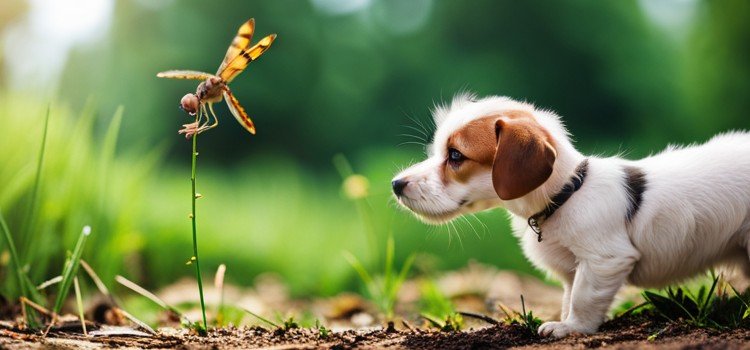As an Amazon Associate committed to the mission of improving the lives of our readers, Live-Clear.com receives a small commission from eligible purchases made through our affiliate links. This revenue enables us to keep producing insightful articles and other material.
When it comes to the world of insects, dragonflies are fascinating creatures. These delicate, iridescent insects can be found flitting about near ponds, lakes, and gardens, and they often catch our attention with their swift and agile flight patterns. However, as a responsible dog owner, you may have wondered, “Are dragonflies dangerous to dogs?” We will go over this topic in depth in this comprehensive guide, answering any concerns and offering all the information you need to keep your furry buddy safe and sound.

The Fascinating World of Dragonflies
Before we delve into the potential risks dragonflies may pose to dogs, let’s take a moment to appreciate these remarkable insects.
Dragonflies belong to the order Odonata and are ancient insects that have been around for hundreds of millions of years. They are known for their unique life cycle, which includes an aquatic larval stage and a winged adult stage. Their large, multifaceted eyes and intricate wing patterns make them a captivating sight for nature enthusiasts.
Dragonflies’ Behavior and Habits
Understanding the behavior and habits of dragonflies can help us better assess any potential risks they might pose to dogs. The following are some important things to think about:
- Predatory Behavior: Dragonflies are carnivorous insects that primarily feed on other insects. They are skilled hunters and are known for their ability to catch prey in mid-air.
- Aquatic Stage: Dragonfly nymphs, which live in water bodies, play a crucial role in maintaining ecosystem balance by consuming mosquito larvae and other aquatic insects.
- Swift Flight: Adult dragonflies are incredibly agile and can dart through the air with precision. They often patrol areas near water sources, hunting for flying insects.
- Migratory Behavior: Some dragonfly species are migratory and can cover long distances during their annual migrations. This behavior can lead to an increased presence of dragonflies in certain areas during migration seasons.
Dragonflies play a crucial role in controlling the population of flying insects, including mosquitoes, which helps reduce the spread of diseases. Additionally, their migratory behavior allows them to contribute to the pollination of plants and the dispersal of seeds, aiding in the overall biodiversity of different ecosystems.
Are Dragonflies Dangerous to Dogs?
The good news is that dragonflies are not inherently dangerous to dogs. They do not possess venomous stingers, poisonous bites, or harmful toxins. In general, dragonflies are completely harmless to humans and pets.
There are a few things to keep in mind, though:
Ingestion: One concern with dogs and dragonflies is the potential for ingestion. Dogs, in their playful or curious mood, might catch and swallow a dragonfly. In most cases, this is not harmful, as dragonflies are not toxic. However, large dragonflies might be difficult for a dog to digest, leading to stomach discomfort or vomiting.
Chasing: Dogs that are avid dragonfly chasers might be at risk of minor injuries, such as scratches or bites. Dragonflies have sharp mouthparts, but they are not designed to harm animals. Any wounds from a dragonfly are typically superficial and unlikely to lead to infections.
Potential Concerns for Dogs
While dragonflies are not inherently dangerous, here are some potential concerns related to dogs and dragonflies:
Overexcitement
Dogs are naturally curious and may become overexcited when they see dragonflies flying around. This can lead to erratic behavior, such as chasing the dragonflies, which might result in accidents or injuries. Additionally, some dogs may have a strong prey drive and view dragonflies as potential targets to be caught or chased. This can lead to them becoming fixated on the insects, potentially causing them to ignore commands or become easily distracted during walks or outdoor activities.
Ingestion
Some dogs may attempt to catch and eat dragonflies. While dragonflies are not toxic to dogs, consuming them in large quantities might lead to stomach upset or gastrointestinal discomfort. Dog owners must monitor their pets closely and discourage them from eating dragonflies to prevent potential digestive issues. If a dog does consume a large number of dragonflies or shows signs of discomfort after ingestion, it is recommended to consult a veterinarian for further guidance and evaluation.
Avoiding Harmful Chemicals
Dragonflies are sensitive to environmental changes, and some areas may be treated with pesticides. If your dog consumes a dragonfly from an area recently treated with pesticides, it could harm your pet. To ensure the safety of your dog, it is important to keep them away from areas where pesticides have been used and to wash any produce or plants thoroughly they may come into contact with. Additionally, if you suspect your dog has ingested a dragonfly from a treated area, it is crucial to seek immediate veterinary attention to prevent any potential toxicity or adverse reactions.
Signs of a Dragonfly Encounter
If your dog has encountered a dragonfly, you may notice the following signs:
- Excitement: Your dog might appear excited or hyperactive during and after the encounter.
- Excessive Drooling: In some cases, dogs might drool more than usual, particularly if they have ingested a dragonfly.
- Vomiting: If your dog swallows a dragonfly and has difficulty digesting it, they might vomit to expel the insect.
- Scratches or Bites: If your dog was particularly persistent in chasing a dragonfly, you might notice minor scratches or bites on their snout or paws.
It is important to monitor your dog for any signs of discomfort or distress after encountering a dragonfly. Additionally, if your dog continues to exhibit any unusual symptoms or if you have concerns about their health, it is best to consult with a veterinarian for further guidance.
How to Prevent Dragonfly Interactions
Preventing dragonfly interactions with your dog is relatively straightforward:
- Supervision: When outdoors with your dog, supervise their activities and discourage chasing or consuming insects.
- Training: Teaching your dog basic commands, such as “leave it” or “drop it,” can help redirect their attention away from dragonflies.
- Insect Repellents: If you live in an area with a high population of dragonflies and are concerned about interactions, consider using pet-safe insect repellents or keeping your dog indoors during peak dragonfly activity.
It’s important to note that dragonflies are generally harmless to dogs and can even be beneficial in controlling mosquito populations. However, if your dog has a history of allergic reactions or if you notice any unusual behavior after encountering dragonflies, it’s best to consult with a veterinarian for further guidance.
What to Do if Your Dog Interacts with a Dragonfly
If your dog encounters a dragonfly, there’s no need to panic. Here are some steps to take if such an interaction occurs:
- Observe: Watch your dog’s behavior closely. If they seem overly excited or interested in the dragonfly, try to redirect their attention to a toy or another activity to avoid potential accidents.
- Prevent Ingestion: If your dog attempts to catch and eat a dragonfly, try discouraging this behavior. Dragonflies are not a suitable source of nutrition for dogs, and you should prevent them from consuming large numbers of these insects.
- Monitor for Illness: If you suspect your dog has ingested a dragonfly from an area treated with pesticides and they exhibit signs of illness (vomiting, diarrhea, lethargy), contact your veterinarian for guidance.
It is important to note that not all dragonflies are harmful to dogs, but it is still best to discourage ingestion as a precautionary measure. Additionally, suppose your dog continues to show signs of illness or discomfort after ingesting a dragonfly. In that case, it is crucial to seek professional advice from your veterinarian to ensure their well-being.

Conclusion
In conclusion, dragonflies are not dangerous to dogs. These captivating insects do not bite, sting, or carry toxins that can harm your furry friend. While interactions between dogs and dragonflies may lead to concerns related to overexcitement, ingestion, or exposure to pesticides in some cases, there is no need to fear these insects. By understanding the behavior and characteristics of dragonflies, pet owners can better protect their dogs from any potential risks. It is important to supervise your dog’s outdoor activities and prevent them from consuming dragonflies or other insects. Additionally, keeping your yard free from pesticides and using natural pest control methods can further ensure the safety of your furry friend.
Frequently Asked Questions (FAQ)
No, dragonflies cannot bite dogs or any other animals. They lack mouthparts for biting and are primarily focused on hunting other insects in the environment.
Dragonflies are not poisonous to dogs. They do not produce toxins that can harm your canine companion. While some insects can be toxic, dragonflies are not among them.
If your dog chases dragonflies, it’s important to monitor their behavior to prevent any accidents. Redirect their attention to a safe and engaging activity to ensure their safety and avoid potential harm.
No, there are no known dragonfly species that are harmful to dogs. Dragonflies primarily prey on other insects and do not pose a direct threat to dogs. They need more tools to hunt larger animals.
While consuming an occasional dragonfly is unlikely to make your dog sick, it’s best to discourage them from doing so. Dragonflies are not a suitable source of nutrition for dogs, and eating them in large quantities might lead to stomach upset or gastrointestinal discomfort.
As a responsible dog owner, it’s essential to monitor your dog’s behavior when they encounter dragonflies and take appropriate measures to ensure their safety. By understanding the nature of dragonflies and the potential risks; you can continue to enjoy the beauty of these insects in your outdoor adventures without worrying about your beloved canine companion’s well-being. If you suspect your dog has ingested a dragonfly from an area treated with pesticides and exhibits signs of illness, contact your veterinarian for guidance.
Amazon and the Amazon logo are trademarks of Amazon.com, Inc, or its affiliates.



